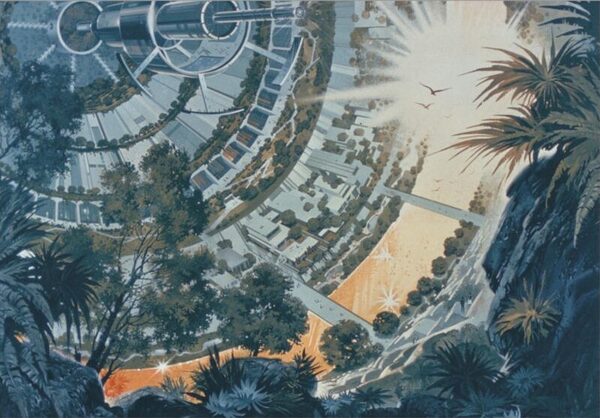This article explores: Bernal Spheres and the future of human evolution: How living in space could affect our biology. Find out more about Bernal spheres and the future of human evolution.
As humanity begins to look beyond Earth and towards the stars, the prospect of living in space for extended periods of time is becoming increasingly real.

One concept that has been proposed for long-term space habitation is the Bernal Sphere, a self-contained, rotating habitat that simulates gravity and provides a closed environment for humans to live and work in.
While the concept of a Bernal Sphere offers exciting possibilities for the future of space exploration, it also raises important questions about how living in space could affect human biology.
In this article, we will explore the potential impacts of living in a Bernal Sphere on human biology and evolution, and consider what this could mean for the future of humanity beyond Earth.
Will Life In A Bernal Sphere Effect Human Evolution?
The long-term effects of living in a Bernal Sphere on human evolution are uncertain, as this would depend on a variety of factors such as the genetic diversity of the population, the duration of habitation, and the selective pressures present within the environment.
In the short term, it is unlikely that living in a Bernal Sphere would have a significant impact on human evolution.
The environment within the sphere would be carefully controlled and optimized for human survival, which would reduce the selective pressures that might drive evolutionary change.
Additionally, the population within the sphere would likely be a small subset of the larger human population on Earth, which would limit the potential for genetic divergence and the emergence of new traits.
Over the long term, however, it is possible that living in a Bernal Sphere could create selective pressures that are different from those experienced on Earth, which could drive evolutionary change.
For example, the reduced gravity within the sphere could lead to changes in bone density and muscle mass, while the closed environment could create new disease risks or affect the microbiome of the population.
These changes could potentially be passed down to future generations, which could lead to evolutionary divergence over time.
It is also worth noting that the development of advanced genetic engineering technologies could potentially allow for intentional modifications to the genetic makeup of the population living in a Bernal Sphere, which could have significant implications for human evolution.
Overall, while the impact of living in a Bernal Sphere on human evolution is uncertain, it is possible that this environment could create new selective pressures that drive evolutionary change over time.
What Will Life Be Like In A Bernal Sphere?
Life in a Bernal Sphere would be quite different from life on Earth, as the environment within the sphere would be carefully controlled and optimized for human survival.
Bernal Sphere life would be a unique and challenging experience, requiring adaptation to a new and carefully controlled environment. However, it could also offer opportunities for exploration, discovery, and the development of new technologies and social structures.
Here are some of the key characteristics of life in a Bernal Sphere:
Artificial Gravity:
One of the most significant differences between life in a Bernal Sphere and life on Earth is the presence of artificial gravity. The sphere would be designed to rotate around a central axis, which would create centrifugal force that simulates the effects of gravity. The artificial gravity would be carefully controlled to ensure that it is consistent throughout the sphere, and it would be set to a level that is comfortable for human habitation.
Self-Contained Environment:
The Bernal Sphere would be a closed environment, with all necessary resources generated and recycled within the system. This would include air, water, food, and other necessities, all of which would be carefully monitored and controlled to ensure that they meet human needs. Waste would be recycled and reused whenever possible, with minimal environmental impact.
Limited Space:
While a Bernal Sphere would be quite large, it would still be a finite space, and inhabitants would need to adjust to living in a more confined environment than they might be used to on Earth. This could require changes in lifestyle and behavior, as well as the development of new social norms and customs.
High-Tech Infrastructure:
The Bernal Sphere would be a highly advanced technological environment, with sophisticated systems for energy production, environmental control, and resource management. It would likely be highly automated, with many tasks carried out by robots or other advanced machines.
Diverse Community:
The Bernal Sphere would likely be home to a diverse community of individuals from many different backgrounds and cultures. This could create a rich and vibrant social environment, but could also lead to challenges related to communication and cooperation across cultural and linguistic boundaries.
Which Ways Will Human Biology Develop While Living In Space?
Living in space, particularly in a microgravity environment, could have several impacts on human biology over time.
While some of these changes could be harmful to human health, others could potentially be adapted to through technology and medical interventions.
Understanding how human biology responds to space is an important area of research for the future of space exploration and colonization.
Here are some of the ways that human biology could develop while living in space:
Changes in Bone Density and Muscle Mass:
Without the constant stress of gravity, bones and muscles in the human body could weaken and atrophy over time. This could lead to a loss of bone density and muscle mass, which could make it difficult for astronauts to return to Earth or adjust to living in a gravitational environment.
Vision Changes:
Some astronauts who have spent extended periods of time in space have experienced changes in their vision, including nearsightedness and changes to the structure of the eye. This is thought to be related to the fluid shifts that occur in the body in microgravity.
Alterations in the Immune System:
The space environment could alter the function of the immune system in ways that are not yet fully understood. Some studies have suggested that exposure to radiation and other factors in space could lead to changes in the immune system that could increase the risk of infection and other health issues.
Sleep Disturbances:
The lack of a day-night cycle in space could disrupt the body’s circadian rhythm, leading to sleep disturbances and other related health problems.
Increased Radiation Exposure:
The space environment exposes astronauts to higher levels of radiation than they would experience on Earth. This could increase the risk of cancer and other health problems over time.
References for Bernal Spheres and the future of human evolution: How living in space could affect our biology.
O’Neill, G. K. (1976). The colonization of space. Physics today, 29(9), 32-40.
Fundamental Biological Features of Spaceflight: Advancing the Field to Enable Deep-Space Exploration. Ebrahim Afshinnekoo, Ryan T. Scott, Matthew J. MacKay, Eloise Pariset
Smith, S. M. (2014). Spaceflight and immune function: clinical relevance. Current pharmaceutical design, 20(38), 6074-6081.
Clément, G. (2005). Fundamentals of Space Medicine (2nd ed.). Springer.
Bigelow Aerospace. (n.d.). Bernal sphere. Retrieved from https://bigelowaerospace.com/technology/bernal-sphere/
National Aeronautics and Space Administration. (2021). The space environment and human health. Retrieved from https://www.nasa.gov/hrp/bodyinspace
Reynolds, R. (2018). Biology and medicine in space exploration (2nd ed.). CRC Press.
Johnson, L. M., De Graaf, J. B., & Norsk, P. (2018). Space physiology VI: exercise, artificial gravity, and countermeasure development for prolonged space flight. European Journal of Applied Physiology, 118(1), 1-4.
‘Bernal Spheres and the future of human evolution: How living in space could affect our biology’ is one important topic in our series exploring the role of Bernal Spheres in space colonization.
Read more about these topics by following the links below:
Republished by Blog Post Promoter
